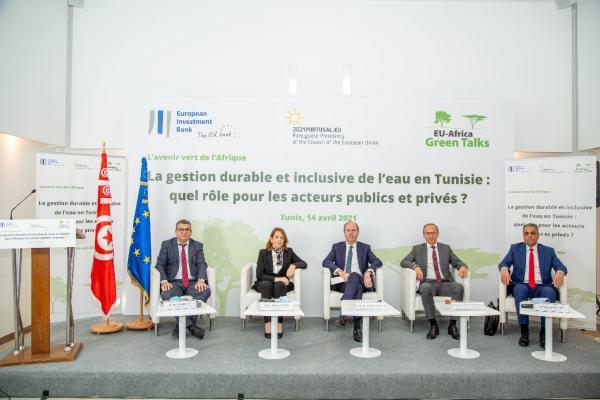
A Green Talk on the theme of “sustainable and inclusive water management in Tunisia: what role do the public and private sectors play?” was held in Tunis yesterday, 14 April 2021, as part of the 30 days of dialogue on the green transition in Europe and Africa. This series of talks has been jointly organised by the Portuguese Presidency of the Council of the European Union and the European Investment Bank (EIB) in the context of the High-Level EU-Africa Green Investment Forum, which will take place in Lisbon on 23 April 2021.
Under the aegis of the Ambassador of Portugal to Tunisia, HE Nuno de Mello Bello, the conference brought together national and international stakeholders from the public and private sectors, providing a forum to exchange best practices and lessons learnt on the inclusive and sustainable management of water resources.
Faced with high water stress, Tunisia has begun a strategic review of water policy. The discussions centred on national plans for sustainable and efficient water management.
Addressing the challenges of water security
Akissa Bahri, former Minister of Agriculture, Water Resources and Fisheries, stressed the need for water security to achieve development objectives: “Climate change means that future public policy will need to focus on water, especially through innovation and increased investment.” The government therefore needs to “involve the private sector and mobilise international and bilateral resources.”
EIB – climate and environment bank
Jean-Luc Revéreault, Head of the EIB Representation to Tunisia, highlighted the strategic long-standing partnership between Tunisia and the EIB: “We have supported and continue to support national efforts in the green transition. Today, the EIB is a key player in the water and sanitation sector. We are financing several projects to ensure the supply of water to the Tunisian population and to improve the treatment of wastewater, including the construction of the Bejaoua plant, which will cover the supply of drinking water to the entire population of Greater Tunis by 2040.”
Public-private partnerships for the green transition
Atef Majdoub, President of the General Authority for Public-Private Partnerships, stressed the important role that public-private partnerships can play in the development of the infrastructure necessary for water supply and treatment. “Recognising the importance of the private sector and its contribution to sustainable water resource management, the Tunisian government has reformed the legal framework for public-private partnership projects. The new law allows the private sector to provide more assistance to public operators in the green transition, and more specifically in the water sector.”
The meeting also provided an opportunity to discuss the Portuguese water resource management model. “In response to the unsustainable management of its water resources, Portugal was compelled to reform the legal framework and to establish a new management model based on the opening up of the water sector to private companies and the creation of multi-municipal management systems,” said Cláudio de Jesus, CEO of Águas de Portugal Internacional.
Watch the recorded live stream

©EIB
Download original

©EIB
Download original

©EIB
Download original